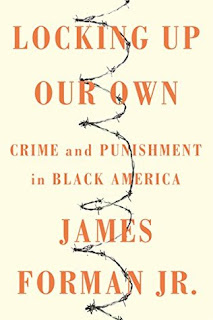Locking Up Our Own
The statistics are shocking and appalling: "Nationally, one in three young black men was under criminal justice supervision. In Washington, D.C., the figure was one in two." And "Roughly 20 percent of America’s prisoners are in prison on drug charges. As a result, even if we decided today to unlock the prison door of every single American behind bars on a drug offense, tomorrow morning we’d wake up to a country that still had the world’s largest prison population."
James Forman Jr. has written a stinging book, Locking Up Our Own: Crime and Punishment in Black America, and it won a Pulitzer Prize. But it wasn't quite what I expected it to be. It deals almost exclusively with Washington, D.C., where Forman worked as a public defender, and at times has had the highest crime rate and murder rate in the country.
Forman presents a trail of how we got this way, mostly with arguments that were supposed to end crime but only increased it. He talks about three things, mainly: guns, drugs, and minimum sentences. He details how their was a huge fight over gun control, with some seeing the elimination of guns as the solution to the problem, but other black leaders advocating that blacks carry guns to defend themselves (I've always though that if black people started buying a lot of guns Congress would pass gun control in a heartbeat--it happened when the Black Panthers were active--Ronald Reagan signed a gun bill as governor of California).
There was also an argument over decriminalization of marijuana. Some were for it, others against it on moral grounds, i.e., that it destroyed our youth and led to more dangerous drugs: "In 1975, black ministers had helped defeat decriminalization, arguing that marijuana was a gateway to heroin. By 2014, the ministers had concluded that marijuana was instead a gateway to the criminal justice system." Then there was a try at minimum sentencing, also pushed forward by black leaders, but that backfired because it led to people being given Draconian sentences that were way out of line with other crimes.
Forman doesn't give his opinion on any of these, although he does write about people he represented and how unfair minimum sentences can be, mostly that it is unfair to people of color and takes compassion and common sense out of judges' hands. Forman seems to indicate that sociological changes, such as addressing poverty and joblessness and treating drug addiction as a health issue and not a criminal one would be more effective.
What is clear is that crime and punishment in the U.S. is unfair when it comes to people of color. Every day it seems you read about some white man who is given probation only for a horrible sex crime, while black men are given strict sentences for minor crimes. That is exists in our supposedly post-racial society is the real crime.
James Forman Jr. has written a stinging book, Locking Up Our Own: Crime and Punishment in Black America, and it won a Pulitzer Prize. But it wasn't quite what I expected it to be. It deals almost exclusively with Washington, D.C., where Forman worked as a public defender, and at times has had the highest crime rate and murder rate in the country.
Forman presents a trail of how we got this way, mostly with arguments that were supposed to end crime but only increased it. He talks about three things, mainly: guns, drugs, and minimum sentences. He details how their was a huge fight over gun control, with some seeing the elimination of guns as the solution to the problem, but other black leaders advocating that blacks carry guns to defend themselves (I've always though that if black people started buying a lot of guns Congress would pass gun control in a heartbeat--it happened when the Black Panthers were active--Ronald Reagan signed a gun bill as governor of California).
There was also an argument over decriminalization of marijuana. Some were for it, others against it on moral grounds, i.e., that it destroyed our youth and led to more dangerous drugs: "In 1975, black ministers had helped defeat decriminalization, arguing that marijuana was a gateway to heroin. By 2014, the ministers had concluded that marijuana was instead a gateway to the criminal justice system." Then there was a try at minimum sentencing, also pushed forward by black leaders, but that backfired because it led to people being given Draconian sentences that were way out of line with other crimes.
Forman doesn't give his opinion on any of these, although he does write about people he represented and how unfair minimum sentences can be, mostly that it is unfair to people of color and takes compassion and common sense out of judges' hands. Forman seems to indicate that sociological changes, such as addressing poverty and joblessness and treating drug addiction as a health issue and not a criminal one would be more effective.
What is clear is that crime and punishment in the U.S. is unfair when it comes to people of color. Every day it seems you read about some white man who is given probation only for a horrible sex crime, while black men are given strict sentences for minor crimes. That is exists in our supposedly post-racial society is the real crime.



Comments
Post a Comment